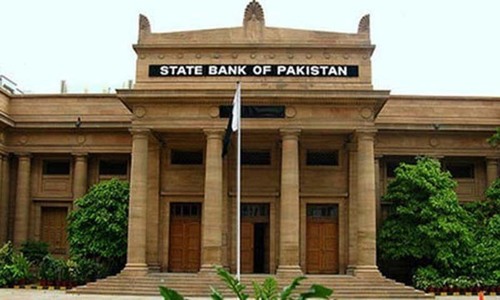The State Bank of Pakistan (SBP) wants to remain focused on its traditional functions of maintaining price and exchange rate stability and regulating and supervising the financial system. And it wants more autonomy to discharge this function independently.
But the central bank is reportedly seeking a limited role for itself in achieving macroeconomic goals.
How soon the SBP will succeed in getting what it wants depends largely on how soon all stakeholders agree on what is in the best interest of the country. But the central bank’s quest for greater autonomy is fully backed by the International Monetary Fund (IMF).
The SBP has been through an arduous journey of evolution since mid-1993 when Dr Muhammad Yaqub was brought from the IMF to head it. During his six-year-plus tenure, Pakistan Banking Council was disbanded and the SBP took full regulatory control of banks. But sadly, this did not result in the end of political influence on banks. Governor Yaqub then introduced IMF-backed Financial Sector Deepening and Restructuring Programme that led to the privatisation of state-run banks, set the stage for the launching of new private banks and established benchmarks for sound banking operations.
Meanwhile, the central bank continued formulating monetary policy albeit under the heavy influence of government. It also practised a fixed foreign exchange regime.
The central bank is now trying to persuade the government to relieve it of the additional responsibility of pursuing policies aimed at co-achieving macroeconomic goals
It was in the next six years of Dr Ishrat Husain of the World Bank that the SBP took banking sector reforms to a new height, introduced quasi-controlled, quasi-free foreign exchange regime and introduced comprehensive prudential regulations.
In contrast to Dr Yaqub who spent most of his time in the SBP office, Dr Husain interacted freely and frequently with both government officials and private-sector representatives. His policies became more inclusive accordingly. Dr Yaqub used to complain privately of heavy political influence in the central bank’s policies, but Dr Husain would accommodate unsolicited policy inputs expertly instead of making such complaints. Under the leadership of Dr Yaqub, Pakistan avoided an impending default after the country went nuclear in May 1998 and our foreign exchange reserves started evaporating. Dr Yaqub initiated and Dr Husain continued a rigorous exercise of external debt re-profiling to remove discrepancies for securing a much-needed external debt moratorium.
During Dr Husain’s tenure, the central bank went online and opened up for the press and the public. The SBP also introduced Karachi interbank offering rate (Kibor) to make the interest rate structure truly reflective of market trends and carried on the work already done under the leadership of Dr Yaqub for containing politically influenced growth in bad loans.
Under both Dr Yaqub and Dr Husain, the SBP discharged its statutory obligations of pursuing policies to maintain price and exchange rate stability and the maximum utilisation of the nation’s economic resources.
Dr Husain also welcomed the idea of then finance minister Shaukat Aziz of Monetary and Fiscal Policy Coordination Board to help the Ministry of Finance and the SBP in achieving together the ultimate goals of price and exchange rate stability and economic growth.
Dr Shamshad Akhtar of Asian Development Bank who became the SBP’s head after Dr Husain must be credited for her role in pushing forward the idea of credit marketing by banks and promoting digital banking and trying to discipline the banks’ investment exposure in government debt instruments. But the launch of the 5,000-rupee notes during her tenure triggered a huge controversy. Many analysts expressed fears that these high-value notes would promote corruption and currency smuggling and expand the base of the informal economy. Later on, these fears turned out to be real. These notes were issued on the insistence of the government, but the move was fully supported, and defended in public, by Dr Akhtar.
Five central bank heads who came after Dr Akhtar — Salim Raza, Shahid Hafiz Kardar, Yaseen Anwar, Ashraf Mahmood Wathra and Tariq Bajwa — all tried in vain to contain political intervention in the central bank’s affairs. They also made unsuccessful attempts at ensuring compliance from the government on the limits set for its bank borrowing. Between February 2009 (when Mr Raza became SBP chief) and May 2019 (when Mr Bajwa left the central bank as its head), the SBP could not enforce enough discipline in foreign exchange markets owing to political pressure. Monetary policy was also unduly influenced by Islamabad.
But all of them did their best to improve the financial sector’s risk mitigating mechanism and Pakistan skipped the negative effects of the 2007-08 global financial meltdown to a great extent. They also introduced more sectoral prudential regulations or improved them. They transformed monetary policy formulation and took Islamic banking, introduced during the days of Dr Husain, to new heights. They also enhanced the scope of agricultural lending, mortgage finance and consumer loans.
When the incumbent governor, Dr Reza Baqir of the IMF, was brought in as SBP chief in May 2019, he started asserting the central bank’s independence. He even showed his reservation about the role of the Monetary and Fiscal Policy Coordination Board. It was under his leadership — and due to the IMF’s conditionality as part of its ongoing $6.9 billion loan — that the government agreed to let the SBP run a truly market-oriented exchange rate system. The government also started retiring its borrowing from the SBP on a net basis to ultimately take it to zero. The launch of a single treasury account for the government also goes to his and the IMF’s credit.
The SBP is now trying to persuade the government to relinquish it of the additional responsibility of pursuing policies aimed at co-achieving macroeconomic goals and allow it to begin inflation-targeting as the anchor of its monetary policy.
Published in Dawn, The Business and Finance Weekly, November 2nd, 2020
















































Dear visitor, the comments section is undergoing an overhaul and will return soon.